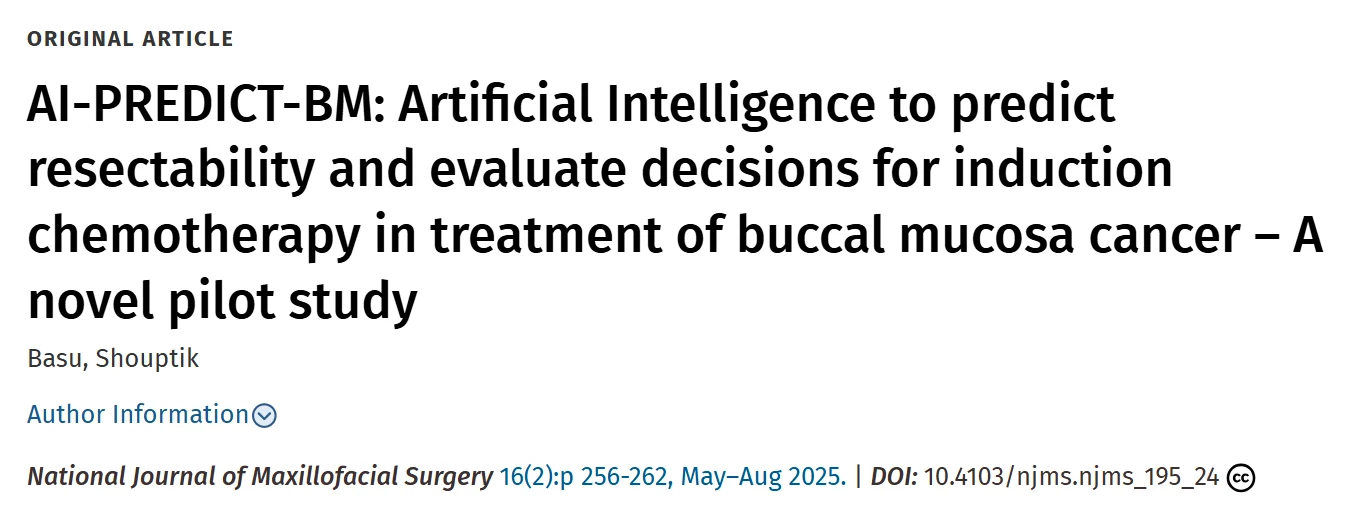Shouptik Basu, Consultant Surgical Oncologist at Saroj Gupta Cancer Centre and Research Institute, shared an article he authored, published in the National Journal of Maxillofacial Surgery:
“A New Frontier: AI-PREDICT-BM
We are delighted to announce the publication of our PubMed-indexed article:
AI-PREDICT-BM: Artificial Intelligence to Predict Resectability and Evaluate Decisions for Induction Chemotherapy in Buccal Mucosa Cancer – A Novel Pilot Study
The Clinical Challenge
Treatment of carcinoma buccal mucosa – a common head and neck cancer – relies heavily on contrast-enhanced CT (CECT) imaging to determine the extent of disease and surgical resectability.
However, in many centers, especially across India, diagnostic reporting remains heterogeneous. Assessing subtle extensions into critical areas like the Infratemporal Fossa can significantly influence surgical decisions, and a misjudgment could lead to margin-positive resections or avoidable morbidity.
The AI Solution
This pilot study developed a Deep Learning-based Convolutional Neural Network (CNN) model trained on 256 preoperative CECT scans from patients with Stage IVA and IVB buccal mucosa carcinoma.
The model was designed to distinguish between:
- ‘Resectable Upfront’ cases, and
- ‘Borderline Resectable’ cases that may benefit from induction chemotherapy before surgery.
Key innovations include:
Integration with a Gradio-based Graphical User Interface (GUI): allowing real-time predictions on a local server, accessible even in low-resource settings.
Minimal input requirement: the model uses only four CT cuts, enabling faster, efficient inference.
Performance:
- Training set AUC: 0.9652
- Validation set AUC: 0.9735
- Specificity: up to 98.4%
- Positive Predictive Value: 97.3%
A Step Toward Clinical Decision Support
This work represents, to the best of our knowledge, the first AI-based model from India applying deep learning to Head and Neck cancer surgical decision-making. The goal is not to replace surgeons but to augment clinical judgment – providing consistent, data-driven support where imaging interpretation may vary between centers.
From Scalpel to Python
Interestingly, this project was built end-to-end by a surgeon who spent nearly nine months programming in Python – bridging the gap between clinical expertise and machine intelligence.
This project reaffirmed that technology doesn’t replace doctors – it empowers them. AI can analyze patterns we might overlook, but it still depends on the insight, empathy, and decision-making of the clinician.
Looking Ahead
The AI-PREDICT-BM study marks a small but meaningful step toward personalized, data-driven oncology care. As AI continues to evolve, such innovations will be critical in standardizing diagnosis, predicting outcomes, and ensuring equitable access to advanced cancer care – particularly in resource-constrained environments.”
Title: AI-PREDICT-BM: Artificial Intelligence to predict resectability and evaluate decisions for induction chemotherapy in treatment of buccal mucosa cancer – A novel pilot study
Author: Shouptik Basu
You can read the Full Article in the National Journal of Maxillofacial Surgery.

More posts featuring Shouptik Basu.


